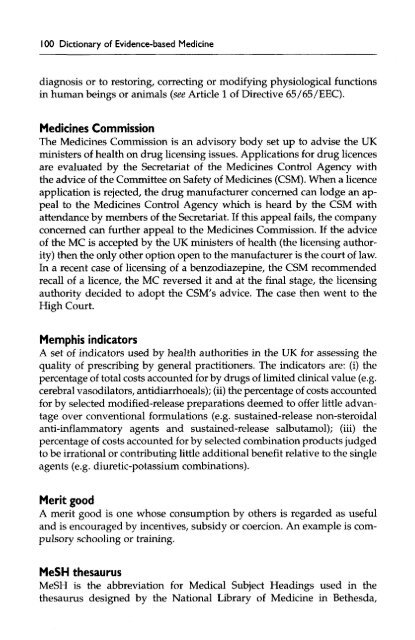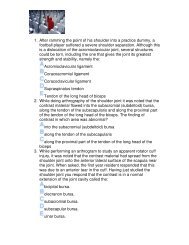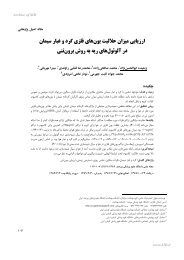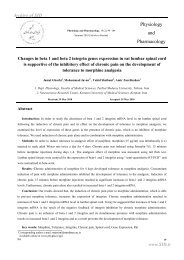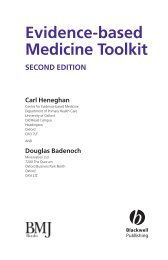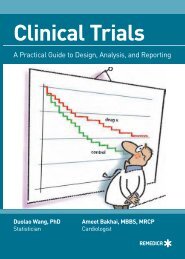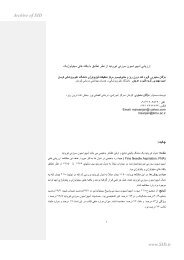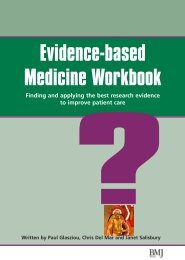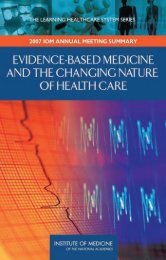Dictionary of Evidence-based Medicine.pdf
Dictionary of Evidence-based Medicine.pdf
Dictionary of Evidence-based Medicine.pdf
Create successful ePaper yourself
Turn your PDF publications into a flip-book with our unique Google optimized e-Paper software.
100 <strong>Dictionary</strong> <strong>of</strong> <strong>Evidence</strong>-<strong>based</strong> <strong>Medicine</strong><br />
diagnosis or to restoring, correcting or modifying physiological functions<br />
in human beings or animals (see Article 1 <strong>of</strong> Directive 65/65/EEC).<br />
<strong>Medicine</strong>s Commission<br />
The <strong>Medicine</strong>s Commission is an advisory body set up to advise the UK<br />
ministers <strong>of</strong> health on drug licensing issues. Applications for drug licences<br />
are evaluated by the Secretariat <strong>of</strong> the <strong>Medicine</strong>s Control Agency with<br />
the advice <strong>of</strong> the Committee on Safety <strong>of</strong> <strong>Medicine</strong>s (CSM). When a licence<br />
application is rejected, the drug manufacturer concerned can lodge an appeal<br />
to the <strong>Medicine</strong>s Control Agency which is heard by the CSM with<br />
attendance by members <strong>of</strong> the Secretariat. If this appeal fails, the company<br />
concerned can further appeal to the <strong>Medicine</strong>s Commission. If the advice<br />
<strong>of</strong> the MC is accepted by the UK ministers <strong>of</strong> health (the licensing authority)<br />
then the only other option open to the manufacturer is the court <strong>of</strong> law.<br />
In a recent case <strong>of</strong> licensing <strong>of</strong> a benzodiazepine, the CSM recommended<br />
recall <strong>of</strong> a licence, the MC reversed it and at the final stage, the licensing<br />
authority decided to adopt the CSM's advice. The case then went to the<br />
High Court.<br />
Memphis indicators<br />
A set <strong>of</strong> indicators used by health authorities in the UK for assessing the<br />
quality <strong>of</strong> prescribing by general practitioners. The indicators are: (i) the<br />
percentage <strong>of</strong> total costs accounted for by drugs <strong>of</strong> limited clinical value (e.g.<br />
cerebral vasodilators, antidiarrhoeals); (ii) the percentage <strong>of</strong> costs accounted<br />
for by selected modified-release preparations deemed to <strong>of</strong>fer little advantage<br />
over conventional formulations (e.g. sustained-release non-steroidal<br />
anti-inflammatory agents and sustained-release salbutamol); (iii) the<br />
percentage <strong>of</strong> costs accounted for by selected combination products judged<br />
to be irrational or contributing little additional benefit relative to the single<br />
agents (e.g. diuretic-potassium combinations).<br />
Merit good<br />
A merit good is one whose consumption by others is regarded as useful<br />
and is encouraged by incentives, subsidy or coercion. An example is compulsory<br />
schooling or training.<br />
MeSH thesaurus<br />
MeSH is the abbreviation for Medical Subject Headings used in the<br />
thesaurus designed by the National Library <strong>of</strong> <strong>Medicine</strong> in Bethesda,


